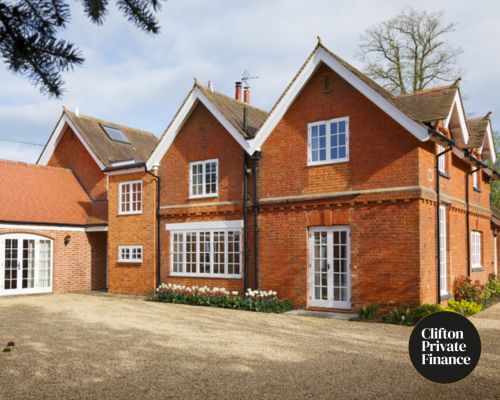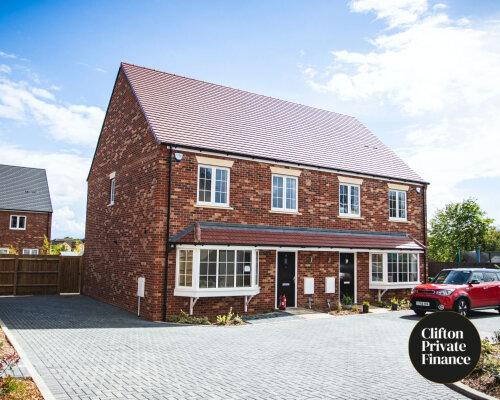
Joint Venture Property Development Finance


We can arrange joint venture property development finance for:






Written by: Sam O'Neill & Sam Hodgson
A joint venture, also known as equity development finance or jv development funding, is where two or more developers pool their resources to fund a project all the way through to completion.
Unlike other more traditional routes to property development finance, it is possible to access up to 100% of the development costs for a project through joint venture funding.
Joint ventures are a popular option for property developers to fund their projects, as they could invest a small amount of their own capital to potentially access a large amount of development finance within a short time period.
Joint ventures property partners usually provide the option to ‘roll up’ interest to repay at the end of the term of finance. This is ideal for property developers, as it allows them to avoid monthly interest payments and frees up their finance to spend on their project.
Joint venture capital funding can be used to facilitate many different development projects including:
Joint venture development finance can bring large-scale, ambitious property projects to life. It provides developers with the necessary capital to acquire land and finance construction, enabling them to realise complex and costly development opportunities.
Joint venture development finance is a financing option that allows property developers to undertake projects without using their capital — instead, the developer partners with a lender who provides all the necessary funds for the project.
The profits generated from the project are typically shared between the developer and the lender upon the property's sale. This financing option eliminates personal investment, allowing developers to pursue other ventures.
It can be particularly beneficial for developers with limited resources or those seeking to optimise their financial flexibility.
100% development finance - This is when a lender provides the entire funding for a development project, and the developer doesn't need to contribute any upfront capital. The lender takes on the financial risk, and the developer repays the loan later.
Joint venture finance - This involves collaboration between a developer and an investor or group of investors. They pool their resources and expertise for the project. Profits and risks are shared based on agreed-upon terms and ownership structure.
While there is a distinct difference, 100% development finance can usually only be done through lenders under a joint venture, or collaboration with multiple developers or investors. They are interchangeable terms.
Joint venture development finance is a collaborative model that gathers developers and investors to fund property development projects. Here's a simplified step-by-step explanation:
Effective communication, transparency, and collaboration are essential throughout the process. Joint venture development finance is a collaborative approach that leverages strengths and resources for mutual success in property development finance ventures.
Joint venture development finance provides access to a larger pool of capital compared to traditional financing methods. By partnering with investors, developers can secure the necessary funds to undertake ambitious projects that may have been beyond their financial capacity. This increased funding opens up opportunities for more significant developments and potentially higher returns.
External funding eliminates delays caused by arranging personal finances, allowing developers to proceed rapidly with their projects. This agility helps seize time-sensitive opportunities in the real estate market.
In a joint venture finance arrangement, risks are distributed among the parties involved. Investors share the financial burden with the developer, which mitigates the developer's risk exposure. This shared risk model provides a level of security and encourages investors to actively contribute their expertise and resources to the project's success.
Naturally, this means also that profits are shared which incentivises lenders and investors to contribute to the development project’s success.
Joint venture development finance allows developers to tap into the knowledge and experience of their partners. Investors bring their industry expertise, market insights, and established networks, which can be invaluable in navigating complex development projects. Additionally, investors often contribute resources such as land, technology, or specialised skills, enhancing the overall project capabilities.
Regarding equity and ownership, joint venture development finance allows borrowers to proceed without upfront equity contributions. However, lenders typically secure their investment through property charges or profit-sharing agreements. The specific terms and conditions depend on the lender and the project.
There are various costs associated with joint venture development finance. The loan amount you can obtain will depend on the feasibility of your project and the assessment made by the lender.
It is essential to consider that interest rates for joint venture development finance can vary based on factors such as the lender, the level of risk associated with the project, and prevailing market conditions. To ensure you obtain the most favourable terms, comparing development finance rates from different lenders is advisable. You can try out our comparison service here for free. It’ll compare a host of lenders in a simple and efficient way.
Get Development Finance Quotes »
In addition to interest rates, there are other fees to consider, including arrangement fees, valuation fees etc. It is crucial to understand and incorporate these costs into your financial planning for the project. Here are some examples:
Legal and Administrative Costs – Establishing a joint venture involves legal and administrative expenses. Hiring legal professionals to draft and review the joint venture agreement, conducting due diligence, and addressing regulatory compliance matters incur costs that should be considered.
Management and Operational Costs – Joint ventures require effective management and coordination. Allocating resources for project management, administrative tasks, and ongoing operational expenses should be factored into the overall project costs.
Exit fees – lenders will charge exit fees if you repay the loan before the agreed-upon term. It is essential to carefully review the loan agreement to assess the potential impact of exit fees on the financial viability of your project.
Joint venture development finance eligibility depends on the developer's experience, profitability, planning permission, GDV, and willingness to provide a personal guarantee. Meeting these criteria enhances the chances of qualifying for this type of financing.
Lenders consider the developer's experience and prefer a property developer with a proven track record. Additionally, being able to point to successful past projects of a similar scale will allow you to borrow more.
Demonstrating the profitability of a development project is crucial, with a minimum profit margin of 25% or higher often required. On top of that, obtaining full planning permission beforehand will ensure compliance with regulations - this is a must for lenders to consider your application.
Projects with a GDV of at least £1,000,000 are often prioritised. At the same time, higher GDVs are more attractive due to increased profit potential. Lenders typically require a personal guarantee to secure the debt, usually around 20% of the funding amount.
It's important to follow a strategy, and seek professional guidance, to increase your chances of success with this type of development finance.
These steps will help you manage risks and ensure the smooth execution of your development project.
Firstly, conduct a thorough project assessment by performing a comprehensive feasibility study and risk analysis. This involves identifying potential challenges, evaluating market demand, and assessing the financial viability of your project.
Additionally, effective cash flow management is crucial throughout the development process. Regularly monitor your project's cash flow, anticipate any potential shortfalls, and take proactive measures to address them promptly. This may involve adjusting timelines, negotiating with contractors, or seeking additional funding to ensure the smooth progress of your project.
Collaborating in a joint venture introduces partnership risks, such as differences in vision, decision-making conflicts, or disagreements on project management. Clear communication, shared goals, and a well-defined governance structure can help mitigate these risks and foster a productive partnership.
Lastly, collaborating with experts experienced in development finance, such as mortgage brokers, financial advisors, and project managers, is highly advisable when navigating the complexities of joint venture development finance.
Their knowledge and expertise can provide valuable insights, help you identify potential risks, and guide you through common pitfalls associated with large-scale development projects. Their guidance will assist you in making informed decisions and optimising your chances of securing the necessary financing.
Clifton Private Finance is here to support you if you're seeking a development loan and need assistance finding the perfect lender. With our extensive expertise and knowledge in the development finance market, we can connect you with lenders who meet your specific requirements. We adopt a personalised approach to match you with the right lender for your circumstances, and our comprehensive market access ensures you receive the most competitive rates available.
When it comes to important financial decisions, it's always advisable to seek the guidance of a specialist finance broker. Our team is dedicated to ensuring you secure finance at a favourable and affordable rate that suits your needs.
Contact us today at 0117 959 5094 to discover how we can assist you or book a consultation.
While commonly used for large-scale projects, joint venture development finance can also be ideal for smaller projects. Feasibility depends on factors like potential returns, project nature, and availability of interested investors.
It can be used for international projects, facilitating collaboration between developers and international investors. However, international projects require careful evaluation due to legal considerations, cultural differences, and market dynamics.
Consequences depend on the joint venture agreement, which covers project failure scenarios, profit sharing in losses, dispute resolution, and exit strategies.
Tax implications vary based on jurisdiction and circumstances. Joint ventures may have tax considerations related to capital gains, income distribution, partnership taxation, and property transfer taxes. Consult professionals for guidance.
Joint venture development finance is standard for various real estate projects, including residential, commercial, mixed-use, industrial, and infrastructure ventures. Suitability depends on project size, complexity, market potential, and financial viability.
Individual investors with sufficient capital and interest in property development ventures can partner with developers. Participation offers opportunities for diversification, subject to specific terms and requirements.
I approached Clifton Private Finance to help me get a mortgage as an Expat working in the Far East. I would normally 'cut out the middle man' on something like this and try to get myself a deal directly with the banks, but I am now sold on the broker concept and wouldn't hesitate to use Clifton Private Finance again. There were a number of complicating factors such as being an expat, the stamp duty holiday, the sheer amount I wanted to borrow and the fact I wanted it all wrapped up before the Stamp Duty holiday ended. It is clear to me now that the relationship that brokers have managed to foster with their banks means they can simply pull levers and make stuff happen that us ordinary folk cannot. Put simply, they are worth every penny, will take most of the stress out of the lending process, and seem to have access to deals that you just won't find on the internet. Thank you George and Jan for all your hard work!
James M
Luther was excellent. Very clear in his advice and explanations of products and was able to move things on very quickly when we ran into difficulties with the estate agents. Without a doubt I would recommend Luther to all friends, family and colleagues. Luther was a joy to deal with and took a lot of the stress out of a troublesome transaction, from my end. I would view Luther as real asset to Clifton Private Finance Ltd.
William W
The team at Clifton Private Finance has been outstanding, not only in helping me to obtain a mortgage on a slightly unusual home, but also in continuing to provide support and liaise with the lender and solicitors through to completion. Thank you for making the process of buying my first home much easier.
Chantelle S
Sam O'Neill, and the new lender he identified for me, worked tirelessly together using my time constraints, to make sure my mortgage application was completed on time. They are a brilliant company to work with, fast, efficient, open and transparent from the very beginning, and turned a seemingly impossible situation into a viable one. Sam was brilliant throughout the whole process and I would highly recommend him, and his colleague Helen, to anyone without hesitation, I cannot speak highly enough about them.
Myr B
I was incredibly lucky to find Clifton Private Finance after a search on line as their service has been more than exemplary. My point of contact was Sam 0’Neill and he was happy to help at every stage during the application of the bridging loan, making a stressful process much easier to deal with. He was always available by phone or email and gave prompt answers to queries I had as well as always getting back to me when he said he would. That to me is excellent customer service and I cannot thank him personally or the company enough for the support they have given me.
C Jefferey
Adam cannot thank you enough for all your support throughout this arrangement. You have gone more than the extra mile to support us. Without you we would not have got our dream retirement home. You have been most professional and personable. Liz and I would be more than happy if you wanted to use us a reference with respect to any future clients.
Nigel & Liz K - Bristol
You have certainly shown me that you do everything for your clients, including tolerating their excessive emails and questions for updates. I have been kept in the loop, from yourself, about why the delays were occurring (Nationwide, post etc) which I would like to highlight that I really appreciated. I certainly will be able to recommend you to others as and when the need arises.
Mr Morris
I recently contacted Clifton Private Finance after a Google search for bridging finance providers and was immediately struck by their efficiency and support. Forms were emailed over almost immediately and the necessary finance was arranged within a few days. None of the other companies I contacted came close to their professionalism, and the quote that I eventually received was impressive. Thank you Adam, your help has enabled us to reserve the house that we wanted and I certainly recommend you to others.
Mr M. R. - Oxford
Absolutely brilliant. The service was first class, got everything sorted efficiently and were always friendly. Any fees were negligible compared to the service offered. Robert was particularly outstanding.
Charles N
My advisor, Robert, was very helpful in finding the mortgage to suit me. He kept me up to date throughout the process and dealt with any issues when they arose.
Rowena C